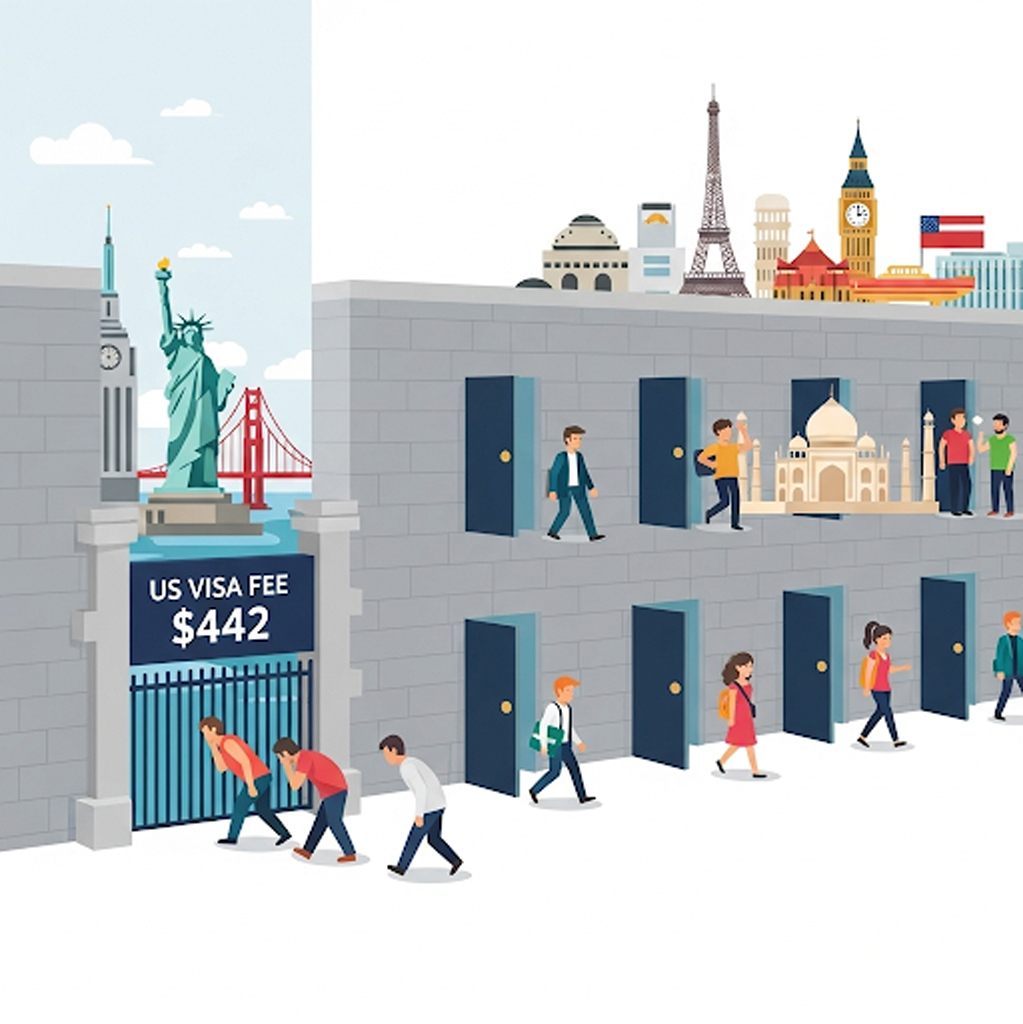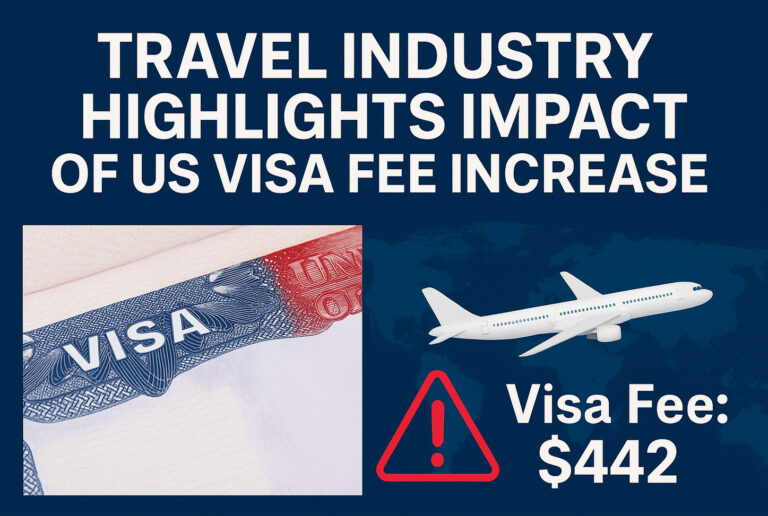Premium Biz Post – The travel industry highlights as governments, airlines, and tour operators express growing concerns over declining international arrivals and potential losses in tourism revenue. This development follows the United States’ recent announcement of a new visa integrity fee, which will take effect on October 1, 2025. The increase has sparked debates across global travel networks, with industry leaders predicting ripple effects not only in the United States but also in the worldwide tourism economy.

A Sharp Increase in Visa Costs
The new US visa integrity fee introduces an additional charge of $250, bringing the total cost for non-immigrant travel visas to $442. This makes the United States one of the most expensive destinations for international travelers who require visas. The changes particularly affect visitors from high-growth tourism markets such as Mexico, India, China, and Brazil, where travel to the US has historically been significant.
US authorities argue that the additional fee is intended to bolster security screening measures, enhance visa processing infrastructure, and maintain border security integrity. However, industry stakeholders fear that this cost increase could serve as a deterrent for potential travelers, especially those from price-sensitive regions.
Tourism Experts Sound the Alarm
Travel experts have expressed worry that the timing of the policy could hinder recovery efforts for global tourism, which has been working to rebound from disruptions caused by the COVID-19 pandemic, geopolitical tensions, and economic uncertainty. The World Travel & Tourism Council (WTTC) estimates that international travel to the US already saw a 3.1% decline in July 2025 compared to the previous year, a concerning trend given the country’s upcoming high-profile events like the 2026 FIFA World Cup and the 2028 Los Angeles Olympics.
“Introducing higher visa fees at this time could discourage travelers from emerging markets, where outbound travel is growing but remains price-sensitive,” said Laura Thompson, a tourism economist based in London. She noted that the decision might have unintended consequences, including reducing tourism revenue, limiting cultural exchange, and weakening business travel inflows.
Economic Implications for the US
Tourism plays a major role in the US economy. According to the US Travel Association, the sector contributed nearly $1.2 trillion in direct spending in 2024, supporting more than 9 million jobs nationwide. The fee hike, though designed to cover administrative costs, could reduce the number of visitors in the coming years, leading to an economic slowdown in hospitality, retail, and transportation sectors.
For major destinations like New York City, Los Angeles, and Miami, which rely heavily on international tourists, even a slight dip in arrivals could lead to noticeable revenue losses. Small businesses—ranging from boutique hotels to local restaurants—are particularly vulnerable, as they depend on the steady flow of international visitors.
Airlines are also voicing concerns. A spokesperson for a leading US carrier said, “While we understand the need for increased security funding, the timing of this policy may discourage travelers from booking long-haul flights to the US, especially when competing destinations are actively lowering entry barriers.”
Global Competition for Tourists
The international travel market is increasingly competitive, with many destinations offering visa-free entry or simplified electronic visa systems to attract travelers. For example, Japan and several European countries have streamlined their visa processes or eliminated fees for short-term visitors, while Southeast Asian nations like Thailand and Indonesia are expanding visa exemptions to boost tourism.
In contrast, the US fee increase risks positioning the country as a less accessible destination. Travel analysts warn that potential visitors may opt for regions offering similar cultural, shopping, and leisure experiences at a lower cost.
“Travelers are price-conscious, especially after the pandemic,” said David Klein, a hospitality consultant. “Countries that make entry easier and cheaper will have an edge. The US should be careful not to lose its competitive advantage in attracting global tourists.”
Repercussions for Business and Education
The visa fee increase does not only affect leisure travelers. International students, conference attendees, and business professionals may also feel the financial strain. For students, this could mean higher upfront costs to pursue education in the US, potentially reducing international enrollment numbers at American universities.
Similarly, multinational corporations may reconsider hosting global conferences and business events in the US if participants face significant financial and bureaucratic hurdles. The ripple effects could undermine the country’s role as a hub for global innovation and commerce.
Universities have already expressed concern that these changes will hurt efforts to attract talent from abroad. “Higher visa fees create barriers for students and scholars, which could lead to a brain drain over time,” said a spokesperson for the Association of American Universities (AAU).
Read More : ”Creative Recycling Used Goods Become Useful”
Perspectives from Affected Countries
Countries like India and Brazil, which send millions of tourists to the US annually, are watching the policy closely. Travel agencies in these regions are reporting a surge in customer inquiries about the new fees, with many expressing frustration over the added cost.
In China, where outbound travel is still recovering from pandemic-era restrictions, travel experts predict that the fee hike may slow the pace of recovery. “Chinese travelers have many options now, and destinations like Europe, Japan, and Southeast Asia are aggressively marketing themselves. If costs rise too much, people will simply choose alternatives,” said Li Wei, a Beijing-based travel agent.
Calls for Policy Reevaluation
Industry organizations are urging US policymakers to reconsider or at least delay the implementation of the fee. Some suggest offering discounts or waivers for first-time travelers, families, or students to maintain demand. Others propose investing in digital visa processing systems to offset costs without burdening applicants.
The National Tour Association (NTA) released a statement emphasizing the importance of international tourism to the American economy:
“Tourism is a bridge between nations, and the United States has long been a top destination for travelers worldwide. We urge policymakers to strike a balance between security and accessibility to ensure our nation remains a welcoming destination.”
Traveler Sentiment and Social Media Response
On social media platforms like X (formerly Twitter) and Instagram, reactions to the visa hike have been mixed. While some travelers understand the need for improved security measures, many feel that the cost increase adds unnecessary barriers to travel. Popular travel bloggers have begun comparing the US visa process to other countries, highlighting longer processing times and higher costs as key deterrents.
This online discourse has the potential to influence public perception of the US as a destination, especially among younger travelers who often rely on digital reviews and recommendations when planning trips.
Preparing for the Future
The debate around the US visa fee increase underscores the delicate balance between national security and global mobility. While protecting borders and ensuring safety remain top priorities, industry leaders stress the importance of maintaining openness in a rapidly evolving tourism landscape.
Travel companies are already adapting, offering package deals and discounts to offset the added costs for their customers. Airlines are exploring partnerships to provide incentives, such as extra miles or complimentary upgrades, to retain international travelers.
If managed carefully, these measures could mitigate the immediate fallout. However, the long-term impact of the policy will depend on how effectively the US can maintain its image as a welcoming, accessible, and diverse destination.
The travel industry highlights impact of US visa fee increase not only as a national issue but as a global concern that reflects shifting dynamics in the travel and tourism sector. As other destinations simplify entry requirements to attract visitors, the US risks losing its competitive edge by raising barriers. Stakeholders urge swift action to balance security needs with accessibility, ensuring that the country remains a top choice for international travelers in the years ahead.



